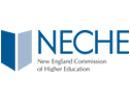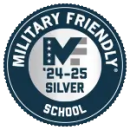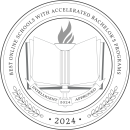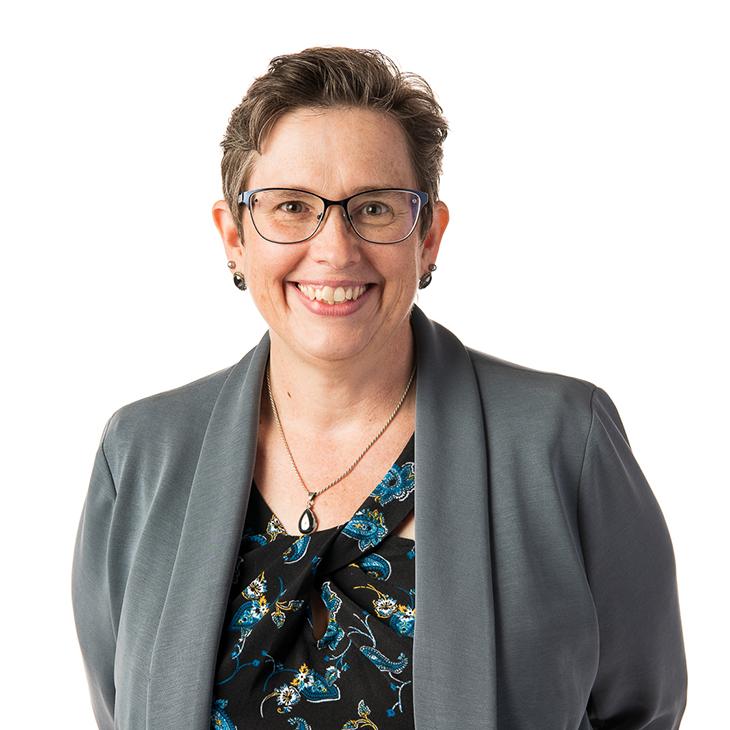ACCT-130
Build Your Foundation in Accounting
Start your journey in accounting with Champlain College Online’s Associate of Science in Accounting. This program, built around the American Institute of Certified Public Accountants (AICPA) Core Competency Framework, offers a blend of hands-on learning, problem-solving, and critical thinking to prepare you for success in the field.
Finish your program faster with credit for prior learning and experience.
Differentiate your degree and get your resume noticed with a certificate. Speak with your advisor for information.
Essential Skills for a Career in Accounting
- Foundational Accounting Knowledge: Develop essential accounting skills in bookkeeping, financial analysis, and payroll services.
- Real-World Problem Solving: Apply analytical and critical thinking to assess risks and ensure sound financial reporting and internal controls.
- Pathway to CPA and Career Growth: Build a strong foundation to advance toward CPA licensure or continue with a bachelor's degree in accounting.
- Integrated Communication Skills: Learn to convey complex financial information clearly to stakeholders, enhancing your impact in professional environments.
- Business Acumen and Ethical Standards: Understand ethical principles, risk management, and the broader business context surrounding accounting.
Considering Becoming a CPA?
Champlain College students who complete the associate degree in accounting program may decide to apply for a CPA license. A CPA is a Certified Public Accountant, a designation licensed by each state.
In Vermont, to earn a CPA license, individuals are required to demonstrate their knowledge and competence by passing the Uniform CPA Exam. Students should note that CPAs require more than a Bachelor's Degree. The requisite credit hours for the CPA exam are 150 post-secondary credits. This means that a typical undergraduate degree (at 120 credits) is not enough, and students need to take more classes–30 credits' worth–to be eligible for licensure.
Champlain College has determined that its 60 credit online associate degree, nor its 120 credit online accounting bachelor's degree, does not meet the 150 credit requirement for a CPA license in Vermont. The College has not determined whether the Accounting program meets the education requirements for professional licensure in any other state (or the District of Columbia), please find your state of residence on the NASBA website to learn more about what is required to sit for the CPA exam in your state.
Program Curriculum
Champlain's online accounting courses encompass the top skills needed by today's accounting professionals. Graduates of the program are required to complete the following courses:
- Professional Courses (30 Credits)
- General Education Courses (21 Credits)
- General Electives (9 Credits)
Note: Some of the courses in this program are available in 15-week terms only. Please contact your advisor for details and information on how this may impact your time to completion.
Accounting is the language of business. This course introduces the student to accounting from the point of view of the user of financial reports and is appropriate for personal as well as business applications. Students explore the impact of transactions on the financial position and profitability of a business, and analyze financial reports of real-world corporations.
Managerial accounting focuses on the needs of management for accounting information to make informed decisions in the internal operations of a company. Topics include decision-making, accounting for planning and control, cost-volume-profit relationships, and budgeting.
Prerequisites
In this first course of a two-part sequence focusing on financial reporting students will learn theory, concepts, principles and practices underlying preparation of external financial reports, particularly application of generally accepted accounting principles related to disclosure of current and noncurrent assets and principles of revenue recognition on the Balance sheet, Income Statement and Statement of Retained Earnings. Students will also consider broad issues like the environment of financial reporting, the role of financial reporting and the accounting standard-setting process.
Prerequisites
ACCT-130
Building on the knowledge and skills gained in Intermediate Accounting I, students will examine more intensively the application of generally accepted accounting principles for financial reporting and disclosure of current and noncurrent liabilities and stockholders' equity. Students will gain skills related to the advanced measurement, recognition and reporting of these select topics in financial accounting as well as the Statement of Cash Flows.
Prerequisites
ACCT-230
Cost accounting presents the behavioral aspects of accounting and identifies essential data that managers use for planning and controlling, costing products and services, and performance measurement. Students study the basic concepts, uses, and procedures related to types of costs and costing systems and uses this information to solve business problems. They will develop quantitative and qualitative analytical skills to analyze and interpret raw data that support the business decision-making process and inventory costing.
Prerequisites
Complete ACCT-140
This course introduces the core terminology and principles of marketing. Students learn about the marketing mix (product, price, place, and promotion), market segmentation, and how external factors such as the economy, technology, culture, and competition influence marketing decisions. The course also examines how marketing fits within an organization and contributes to business success, along with how ethical considerations, cultural awareness, global trends, and social responsibility shape marketing practices across industries. No prior business experience is required.
Provides an overview of the entire legal system, with an emphasis on contract rights. Discusses the essential elements of a contract, the breach of contracts and the remedies for breach. Presents business and consumer laws, including white-collar crime, landlord-tenant rights, real property interests and administrative law.
Students will learn about the application of positive individual and group strengths and capacities that can be recognized, evaluated, and expanded to advance organizational well-being. This course encourages students to apply positive organizational behavior processes to everyday challenges organizations face to drive positive workplace behaviors and outcomes. This course also helps students to practice and gain skills, knowledge, and competencies to become positive and impactful leaders and change-makers from whatever position they hold.
This course serves as an introduction to forensic (fraud) accounting. Topics include fraud examination techniques, interview techniques, rules of evidence relating to fraud, internal control methodology, asset misappropriation and financial statement misrepresentation. Students cover various fraud examination techniques. Students also learn rules of evidence as they relate to several different fraudulent activities including illegal activities such as wagering, money laundering, cash skimming and embezzlement. Course presentation assumes basic accounting knowledge and guides the student into specialized applied settings, indicative of forensic accounting.
Prerequisites
ACCT-130
Focuses on accounting for state and local governments as contrasted with that for profit-making companies. It acquaints students with fund accounting, budgetary accounts, and governmental financial reporting and introduces accounting for not-for-profit organizations.
Prerequisites
ACCT-231
This course introduces students to the foundational concepts needed to communicate effectively in writing for academic study and professional development. Students will also learn to read critically to evaluate an author's message. Students will be introduced to rhetorical modes and their role in the development of written communication. Students will also learn how to use revision strategies to create written communication that meets its intended purpose for its intended audience
This course builds on students' proficiency in the writing process and rhetorical modes to introduce the use of sources in written communication. Students will practice information literacy as they learn to determine information needs from sources, develop effective search strategies, and incorporate sources in written communication, legally and ethically.
Prerequisites
Complete ENGL-100
Starting with a frame of human communication as a dynamic system of interactions in which people make choices that impact their relationships, other people, and themselves, students will define theory-informed communication concepts and processes, and critically examine how they apply to everyday life across a variety of contexts. Students will reflect on how the theory, concepts and processes apply to their own lives in becoming competent communicators who are knowledgeable, skilled, and versatile.
Students will learn and apply critical inquiry skills to analyze persuasive communication created by others and to develop persuasive communication/arguments of their own to solve problems in professional, civic, social, and personal contexts. Specifically, students will learn to recognize fallacies in logic; apply inductive and deductive reasoning strategies to the interpretation and development of persuasive communication; evaluate the validity of sources; and develop logically sound persuasive communication. Students will explore the roles of self-awareness, empathy, and ethics in the context of critical inquiry and the development of arguments.
Prerequisites
Complete ENGL-110.
Mathematical reasoning, when applied to everyday and professional lives, has two dimensions: logic for deterministic situations and probabilities for non-deterministic situations. This course aims to help students develop these mathematical reasoning skills.
This course introduces students to basic statistics for data literacy. With a focus on exploring real-world data, students will interpret numerical information and utilize the tools necessary to complete the entire statistical process: designing a study; gathering, organizing, and analyzing sample data; and making inferences about a population. Students will demonstrate data-driven decision-making and effective communication of numerical data.
Introduces students to the biochemistry and physiology of nutrition and exercise. Emphasis will be placed on human body systems such as musculoskeletal, digestive, respiratory and circulatory, and their relationship to nutrition and fitness. Students will also study the biochemistry of energy conversion as it relates to exercise physiology. Laboratory sessions are designed to reinforce, by a hands-on approach, the principles discussed in lecture. Course includes two laboratory hours per week.
Students will develop the ability to apply scientific methods to understand the natural world, to identify scientific aspects of daily life, and to evaluate the quality of scientific information based on its source and the methods used for its generation.
With pressure and release, a window opens and closes, recording light on a sensor. The simple action captures the instinct, judgement, and skill of the person behind the lens. This class will begin a study of the art and craft of photography. Students will develop their vision and their understanding of how to achieve it. Solid skills will be learned and many doors will be opened.
A survey of the continuing change experienced in art since the 15th century. Students will examine how an image is achieved as well as the significance of the subject represented. Individual inquiry concerning the nature of art is encouraged.
Students learn to appreciate films through the critical analysis of various elements of mise-en-scene, cinematography, editing and sound. The course introduces the conventions of classical Hollywood cinema, considers the work of one major director (auteur), and surveys selected international and independent films. Students view and discuss films each week.
Additional Program Details
Graduates of the accounting associate online program will demonstrate the following industry-specific skills, knowledge, and competencies.
- Analyze and assess the risks of an organization’s accounting system, including internal controls, to ensure sound financial information, and to generate appropriate asset evaluation and/or to reduce fraud.
- Integrate in-depth financial analysis with effective communication skills to accurately and clearly convey information to stakeholders.Integrate in-depth financial analysis with effective communication skills to accurately and clearly convey information to stakeholders.
- Evaluate progress toward meeting organizational goals by using quantitative and qualitative performance measures that take into consideration risks, internal controls, and ethics.
- Use appropriate accounting tools and financial analyses given complex business, legal, and ethical scenarios.
- Research, synthesize, and evaluate financial information so that results can be communicated to stakeholders in a cohesive and logical way, effectively distinguishing fact from opinion.
- Describe and integrate other aspects of the organization and its various functions when analyzing, evaluating and communicating financial information.
Program competencies are adapted from the American Institute of Certified Public Accountants (AICPA) Core Competency Framework and include:
- Functional competencies: technical competencies most aligned with the value contributed by accounting professionals.
- Personal competencies: individual attributes and values
- Broad business perspective competencies: perspectives and skills relating to understanding of internal and external contexts.
Design your own degree and enhance its value and focus by adding a certificate. Adding a certificate allows you to develop specialized skills, strengthen your résumé, and tailor your education to align with career goals. Choose from the undergraduate certificates on this page.
Note: To earn a certificate, you must speak with your advisor first. You must be officially enrolled in the certificate program before you complete the required courses in it — coursework completed prior to enrollment cannot be applied later, and certificates may not be added retroactively. Careful planning with an advisor is essential to ensure all policies and timelines are met.
Our admissions team seeks to admit students who:
- Demonstrate a solid academic foundation - a minimum 2.5 GPA is our recommendation, though exceptions may be made on a case-by-case basis for those who demonstrate a potential for academic success in other ways.
- Possess an aptitude for success in an online learning environment.
- Exhibit the ability to make a positive contribution to the Champlain College Online community.
To learn more about submitting transcripts, or requirements for home-schooled students, those educated abroad or returning students visit our Undergraduate Admissions page.
We work hard to ensure you get the transfer credits you deserve, from a variety of sources including prior college credits, work experience and training, military training and experience, and more. Our goal is to help you graduate from Champlain College Online as quickly and affordably as possible. Visit our Transfer Credit Options page to learn more.
Champlain College Online's business faculty, led by Department Chair Dr. Elaine Young, are expert practitioners in the field. Their industry expertise ensures that our business management curriculum is aligned with the needs of employers, and reflects the skills today’s business professionals need for success. Classes led by our seasoned experts will give you real-world insight into the business world, and create a rich community of career-focused learning.
Tuition & Costs
Online Undergraduate Tuition Fall '25 - Summer '26
Tuition & Costs
Online Undergraduate Tuition Fall '26 - Summer '27
* Alumni is defined, for this tuition rate, as any degree program graduate from Champlain College or Champlain College Online.
** Veteran rate effective Spring 2025, not retroactive
See the undergraduate cost of attendance and fees here
Affordability and Paying For Your Education
We provide a number of options to make your online education affordable, including preferred tuition for alumni, associate degree graduates, community college graduates, and military.
Move Your Accounting Career Forward
As businesses grow and globalize, the need for skilled accounting professionals increases. The Bureau of Labor Statistics projects a 7% growth* in accounting roles from 2020 to 2030, with a median annual salary of $73,560 for accountants and auditors.
With an Associate of Science in Accounting from Champlain College, you’ll be ready for various accounting roles or to continue your studies for further advancement.
*Source: Bureau of Labor Statistics, 2024
Top Careers for Associate in Accounting Graduates:
- Accounting Assistant
- Accounts Receivable Clerk
- Auditing Clerk
- Bookkeeping Clerk
- Payroll Specialist

Why Champlain
Career Growth
"I had a two-year degree and knew I would need a bachelor's to advance. I saw that the U.S. Department of Labor projected a high demand for employees in accounting, and Champlain is ranked one of the top schools for accounting, so it was the right fit."

Academic Excellence and Recognition

Regionally accredited by the New England Commission of Higher Education

Designated as a Military Friendly School for our commitment to the military community
Ranked among the best by Tech Guide for game design and computer science

Named the among the best schools with accelerated bachelor's degrees by Intelligent.com
Meet the Program Director
Elaine Young, PhD
- Accounting (Certificates, A.S., B.S., M.S.)
- Analytics (Certificates, M.S. Programs)
- Business (Certificates, A.S.,B.S.,MBA)
- Digital Marketing (B.S.)
- Digital Marketing and Technology (M.S.)
- Digital Media (B.S.)
- Esports Management (B.S.)
- Finance (Certificates, A.S., B.S.)
- Healthcare (all programs)
- Human Resource Management
- Leadership (Organizational and Digital Transformation)
- Management Information Systems
- Marketing (M.S.)
- Marketing Analytics (M.S.)
- Marketing & Communication (B.S.)
- Marketing Management (B.S.)
- Positive Organization Development Certificate
- Positive Organizational Psychology & Development
- Project Management
- Public Administration
About
Dr. Elaine Young is the Program Director for all business programs, and Curriculum Innovation Faculty Lead, at Champlain College Online.
As chair, Dr. Young manages the faculty, curriculum, and assessment for undergraduate and graduate programs in the business programs as well as developing and teaching courses. As Curriculum Innovation Faculty Lead, Dr. Young supports creation of new curriculum offerings that serve both the needs of adults continuing their education and employers who need educational opportunities for their employees. Prior to her leadership role at Champlain College Online, Dr. Young has been part of the Champlain College community since 2000 as a professor and faculty advisor for traditional on-campus students. She is a HubSpot Educator and a Certified Appreciative Advisor.
Dr. Young has a Ph.D. in Organizational Management from Capella University, where her dissertation research examined technology use and adoption of college students. In addition, she holds an M.S. in Internet Strategy Management from Marlboro College, a B.S. in Communication and Public Relations from SUNY Brockport and an A.S. in Communication from Genesee Community College. Dr. Young has over ten years of experience in the Marketing and Public Affairs profession, specializing in nonprofits. She is the author of “Tuned-in Family: How to Cope, Communicate and Connect in a Digital World” (2014).

Frequently Asked Questions
Following are some frequently asked questions for our associate of science in accounting.
While an online associate’s degree in accounting provides foundational knowledge, it typically doesn’t offer enough credit hours to meet the requirements for state CPA licensure. However, an associate degree can open up more job opportunities than being a bookkeeper. Graduates often choose to further their education by pursuing a bachelor’s degree or other certificates.
Champlain’s online associate degree in accounting prepares you for various entry-level roles, including:
- Accounting Assistant
- Payroll Assistant
- Tax Preparer
- Assistant Cost Analyst
- Data Entry Clerk
Additionally, some graduates may choose to transfer to our bachelor’s degree program for further specialization.
Yes, Champlain’s online associate accounting degree tends to offer more flexibility than a traditional on-campus program. Distance programs often appeal to students who work full-time, have busy schedules, or are unable to commute to campus. Online programs can be self-paced, but our virtual classrooms have set assignment deadlines to mirror the structure of in-person classes.
Yes! Champlain College’s online associate degree in accounting equips you with practical skills and knowledge, preparing you for a successful career in the accounting field. For those interested in enhancing their accounting skills, Champlain also offers four unique undergraduate online accounting certificate programs as well as a graduate accounting certificate, which provides a deeper dive into specific accounting topics for entry-level positions and career advancement.
You May Also Be Interested In
Get Your Accounting Program Guide
Learn what you can expect from our online associate in accounting program.

Download Program Guide
I acknowledge that, by clicking the "submit" button, I am giving my express written consent to Champlain College and its representatives to contact me about educational opportunities via email, text, or phone, at the phone number above, including my mobile phone, using an automatic dialer, or pre-recorded message. Message and data rates may apply. I understand that my consent is not a requirement for enrollment, and I may withdraw my consent at any time.






